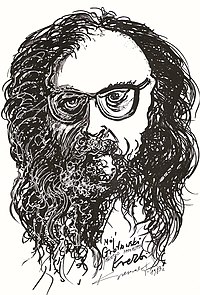Grotowski
| Jerzy Grotowski | |
|---|---|

Grotowski c.1972
|
|
| Born |
11 August 1933 Rzeszów, Poland |
| Died | 14 January 1999 (aged 65) Pontedera, Tuscany, Italy |
| Occupation | Theatre director |
| Alma mater |
Ludwik Solski Academy for the Dramatic Arts in Kraków Russian Academy of Theatre Arts |
Jerzy Marian Grotowski (Polish pronunciation: [ˈjɛʐɨ ˈmarjan grɔˈtɔfskʲi]; 11 August 1933 – 14 January 1999) was an innovative Polish theatre director and theorist whose approaches to acting, training and theatrical production have significantly influenced theatre today. He was born in Rzeszów, in South-eastern Poland in 1933 and studied acting and directing at the Ludwik Solski Academy of Dramatic Arts in Kraków and Russian Academy of Theatre Arts in Moscow. He debuted as a director in 1959 in Kraków with Eugène Ionesco's play Chairs and shortly afterwards founded a small Laboratory Theatre in 1959 in the town of Opole in Poland. During the 1960s, the company began to tour internationally and his work attracted increasing interest. As his work gained wider acclaim and recognition, Grotowski was invited to work in the United States and he left Poland in 1982. Although the company he founded in Poland closed a few years later in 1984, he continued to teach and direct productions in Europe and America. However, Grotowski became increasingly uncomfortable with the adoption and adaptation of his ideas and practices, particularly in the US. So, at what seemed to be the height of his public profile, he left America and moved to Italy where he established the Grotowski Workcenter in 1985 in Pontedera, near Pisa. At this centre he continued his theatre experimentation and practice and it was here that he continued to direct training and private theatrical events almost in secret for the last twenty years of his life. Suffering from leukemia and a heart condition, he died in 1999 at his home in Pontedera.
Jerzy Grotowski was born on 11 August 1933 in the city of Rzeszów, Poland. When the war came in 1939, the strong familial bond that the family shared was severed. His father entered the war and did not return, and his mother, brother and himself moved to the small village of Nienadówka. It was in Nienadówka that the young Grotowski had several essential experiences that would shape him and his work in the future. His mother was also of great influence, with her strong opinions on unity and community.
...
Wikipedia
